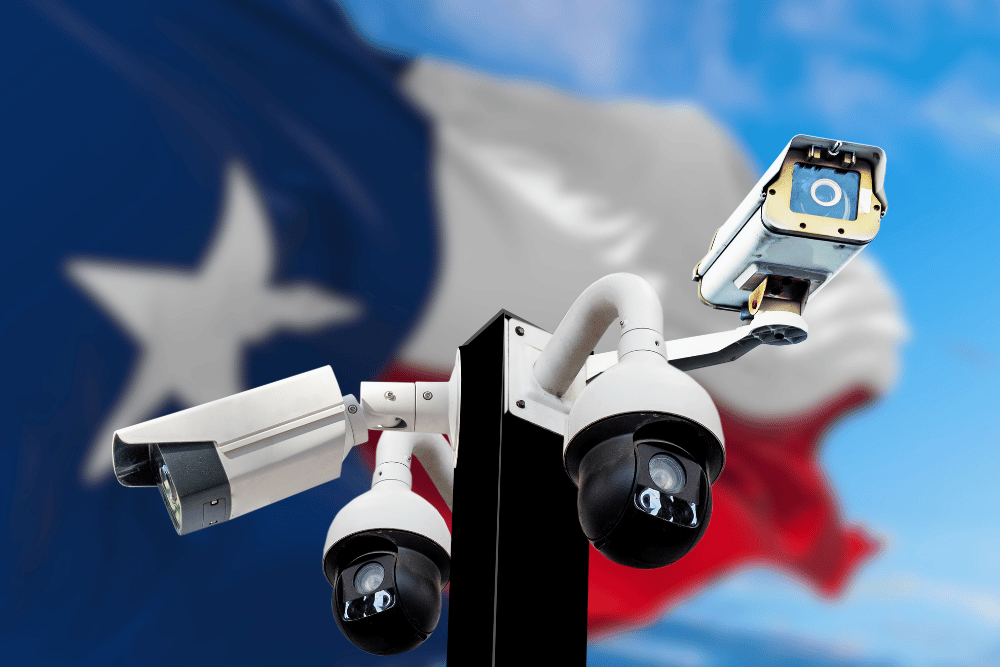Texas Surveillance Laws: An Overview

Texas boasts a diverse landscape of urban hubs and rural expanses—and, in true Texan style, the bigger the better. In a state where ranches are as common as skyscrapers, the need for security is universal, leading many to turn to surveillance systems. But as technology advances, so do questions surrounding privacy and the legality of audio and video recordings. So just what exactly are Texas surveillance laws?
Basics of Texas Surveillance Laws
Texas, like many states, allows the use of security cameras for personal and business security. But that doesn’t mean you can install a video camera anywhere you want. Violating Texas video recording laws is punishable by anywhere from 180 days to 2 years in state jail and a fine not exceeding $10,000, as outlined in Section 21.15 of the Texas Penal Code.
The most important tenant of Texas surveillance laws is respecting the privacy of others. So definitely no cameras in bedrooms, bathrooms, locker rooms, or change rooms. If someone can reasonably assume they are in a private area, cameras would violate the law.
And when it comes to audio recording, the legal waters get even murkier. The Texas Penal Code, Section 16.02, outlines the concept of “one-party consent,” meaning that at least one person involved in the conversation must consent to the recording. This implies that, at least in theory, you can record audio without the knowledge or consent of the other party. But how does this apply to security cameras?
The Grey Area: Audio Recording and Privacy Concerns
Here’s where the surveillance law debate ignites. According to a recent survey conducted by The Texas Tribune, 45% of Texans express concern about audio surveillance infringing on their privacy rights.
If you’re a part of the conversation or you have the consent of at least one participant, you can lawfully record both in-person and electronic communications. If you’re not directly involved, you’ll need to obtain consent from one or more participants, as outlined by the Federal Communications Commission:
- Obtain verbal or written consent before making the recording
- A verbal notification before the conversation begins (e.g. “This phone call is being recorded for quality control purposes…”)
- An audible beep or tone that’s repeated at regular intervals during the duration of the conversation
No consent? You’ve broken the law.
A Guide to Texas Surveillance Laws in Residential Properties
Living in freedom-loving Texas, you might assume your own property is a sanctuary. And to an extent, that’s true. But when it comes to surveillance, the legal landscape gets surprisingly tricky. Let’s untangle the law so you can understand your rights when it comes to cameras and microphones in your own Texas home.
Potential Pitfalls
Installing security cameras on your property is generally legal, as long as they’re not capturing areas where people have a reasonable expectation of privacy, like bathrooms or bedrooms. You don’t need to notify your neighbors unless the cameras are pointed directly at their property. But even legal cameras can create tension with your neighbors, so open communication and respecting boundaries is a good idea.
And because Texas is a one-party consent state, you can legally record any conversation as long as at least one person involved (including yourself) agrees. This applies to security cameras with audio capabilities, too. So, recording your friendly chat with the mail carrier or your backyard BBQ is fine. However, recording conversations without anyone’s consent, even on your own property, is illegal. The penalties for illegal recording can range from fines to five years in jail, so tread carefully.
Stay in Compliance
While security cameras offer peace of mind, remember the following.
- Be mindful of placement: Avoid pointing cameras at private areas or neighboring properties.
- Inform those who might be recorded: Let tenants, guests, and workers know they might be on camera.
- Respect boundaries: Even legal cameras can be intrusive. Consider your neighbors’ privacy and use cameras responsibly.
- Know your rights and limitations: Understand the one-party consent law and avoid illegal recording.
Ultimately, living in a secure yet privacy-conscious environment in Texas is about striking a balance. By following the law and respecting others’ boundaries, you can enjoy the benefits of surveillance technology without infringing on anyone’s right to privacy.
A Guide to Texas Surveillance Laws in Commercial Properties
Running a business in Texas means juggling customers, competition, and, yes, even surveillance laws. While security cameras might seem like common sense, the legal landscape around visual and audio recording at your commercial property can get complicated.
Cameras Without Caveats?
For the most part, yes. Installing security cameras on your commercial property is generally legal in Texas. You don’t need special permits or notifications (unless your location is a government building or selling alcohol), as long as the cameras focus on public areas and not places where people have a reasonable expectation of privacy, like restrooms or locker rooms. Video surveillance is a legally compliant way to give your business strong protection.
Whispers and Words: When Audio Enters the Equation
Again, Texas is a one-party consent state for audio recording, meaning you can legally record any conversation as long as at least one person involved (including yourself) agrees.
However, don’t get overzealous with the record button. Secretly recording conversations without anyone’s consent can get you into trouble. Customers, employees, and other visitors all have legal protection if they are unaware of surveillance devices. The penalties for such violations can be hefty, so always err on the side of caution. A simple sign is sufficient notice for most cases. (But again, don’t record inside of bathrooms and other private spaces.)
An important exception: if burglars enter your property illegally, they lose their right to privacy.
Stay on the Right Side of Texas Surveillance Laws
Here are a few other tips.
- Post conspicuous signage: Let customers and employees know they might be on camera.
- Train your staff: Educate employees on recording policies and their rights.
- Limit audio recording: Use it only for specific security needs, not routine monitoring.
- Respect employee privacy: Don’t record bathrooms, locker rooms, or other private areas.
- Be transparent: Be open about how you use and store recorded data.
By following these guidelines and understanding the law, you can ensure your Texas business thrives under the watchful eyes of security cameras without sacrificing anyone’s right to privacy.
It is also your responsibility as a business owner to keep abreast of changing laws. Houston, for example, recently passed an ordinance that requires bars, nightclubs, “sexually oriented” businesses, gambling rooms, and convenience stores to record constantly outside their premises on behalf of the police and to hand over those recordings without requiring a warrant. Failure to do so can result in a $500 fine per day.
Under-the-Radar Quirks of Texas Surveillance Laws
Texas’s surveillance landscape hides some lesser-known but compelling quirks.
Data Retention in the Dark
Unlike many states, Texas has no statutory limit on how long law enforcement can retain data collected from surveillance cameras or body cameras. This lack of legal guardrails raises concerns about potential long-term monitoring and the chilling effect it might have on public expression and dissent.
Access with Few Questions Asked
Texas law allows broad access to surveillance footage by various entities beyond law enforcement. These include landlords, private businesses, and homeowners’ associations. This raises concerns about the potential misuse of data and lack of individual control over who can view and share personal information captured by cameras. Operate under the assumption that someone else could view your recordings with little to no warning.
Facial Recognition Flies Blind
Despite widespread deployment in schools and other public spaces, Texas has no comprehensive legislation regulating facial recognition technology. This creates a legal vacuum where powerful technologies with the potential for mass surveillance operate without clear boundaries or public oversight. Keep an eye on this slice of the legal landscape over the coming years.
Enhanced and Compliant Security
Deep Sentinel’s advanced security solutions combine AI-powered security cameras with real-time guard protection, offering not just watchful eyes, but proactive intervention. No more sifting through hours of footage. No more stream of false alarm notifications. Live guards actively monitor your property through video surveillance with two-way audio, deterring threats before they escalate, and ensuring the safety of your property. Deep Sentinel goes beyond the limitations of traditional cameras, delivering peace of mind without compromising on privacy.
Contact us today for a free consultation.
Need a Solution that Prevents Crime?
Deep Sentinel is the only security technology that delivers the experience of a personal guard on every customer’s home and business. Visit deepsentinel.com or call 833.983.6006.

